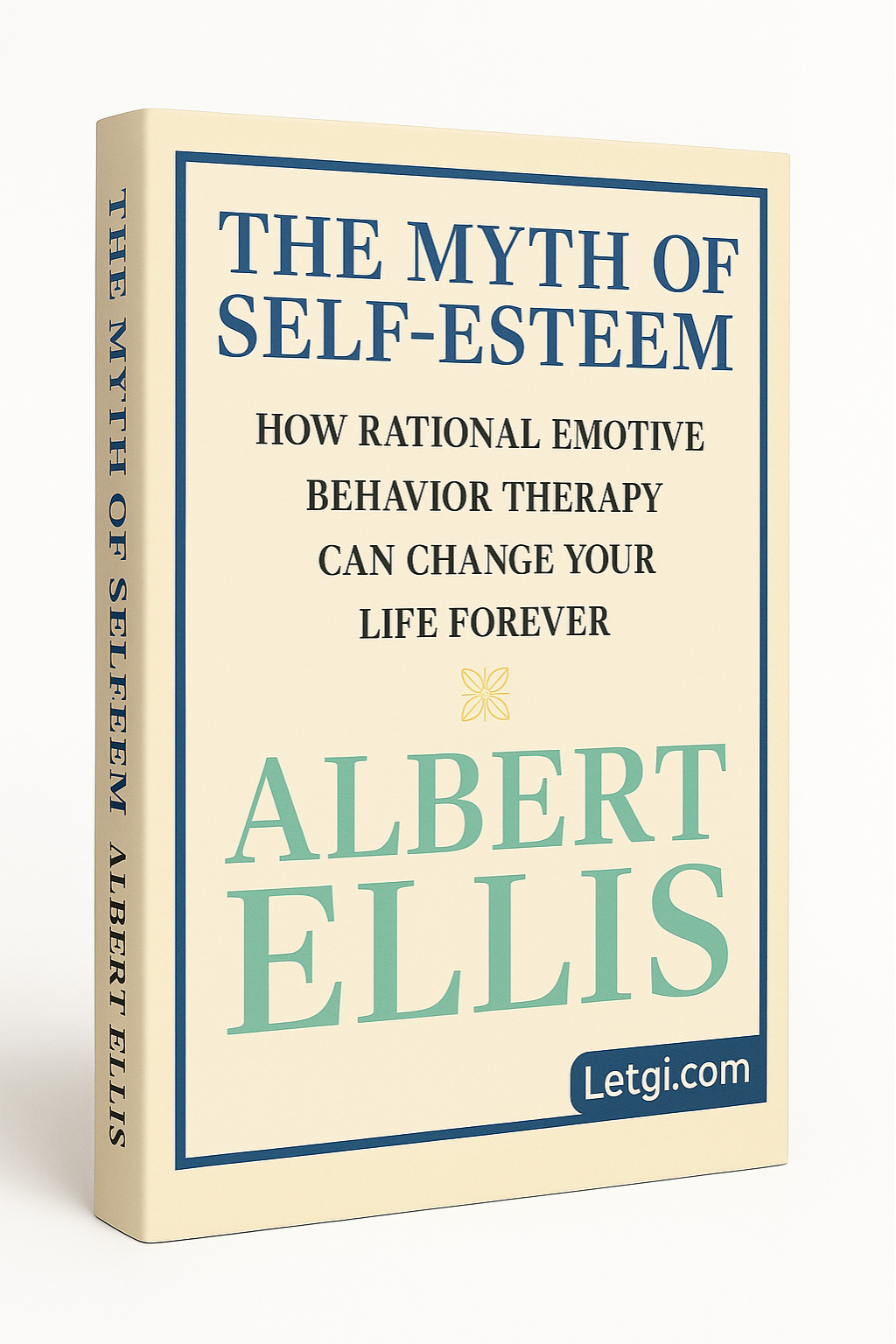In “The Myth of Self‑Esteem,” renowned psychologist Albert Ellis challenges the deeply embedded belief that self‑esteem—based on success, approval, or validation—is the foundation of a healthy psyche. Instead, Ellis presents a counterintuitive yet liberating idea: self‑esteem, as commonly understood, often undermines emotional stability and personal growth. This comprehensive guide proposes unconditional self‑acceptance, rooted in Rational Emotive Behavior Therapy (REBT), as a transformative solution to enduring emotional freedom and inner peace.
The Problem: Why Chasing Self‑Esteem Fails
Most people grow up believing that high self‑esteem is the key to happiness. Yet when it’s dependent on external factors—such as performance, rewards, or praise—it becomes volatile. Fail, and it plunges; succeed, and it soars. This creates a roller‑coaster of emotions, leaving individuals anxious, defensive, or even despising themselves when expectations aren’t met. Ellis argues that this dynamic is damaging—it breeds perfectionism, insecurity, and a fear‑driven life.
A New Framework: Understanding REBT’s A‑B‑C‑D‑E Model
Ellis introduces readers to the core of REBT, a therapeutic method designed to identify and break irrational beliefs through a five‑step cognitive framework:
- A – Activating event: A challenging situation occurred.
- B – Belief: You automatically believed, “I’m inadequate.”
- C – Consequence: You experienced anxiety, demotivation, or self‑criticism.
- D – Disputation: You challenged that judgment—“Is that truly helpful?”
- E – Effective new philosophy: You adopt a more balanced, constructive belief—“I can learn and grow, even if I fail.”
This model equips readers to self‑coach through everyday emotional challenges, ending self‑esteem dependency.
Practical Exercises to Rebuild Inner Strength
Ellis includes numerous hands‑on exercises designed for real life:
- Belief logs: Record moments of self‑judgment and analyze their irrationality.
- Rational reframing: Practice disputing harsh thoughts and cultivating healthier alternatives.
- Behavioral experiments: Intentionally perform actions you fear may expose flaws, and consciously reaffirm self‑acceptance.
- Daily affirmations: Use simple statements affirming inherent worth, independent of behavior or outcomes.
These tools transform self‑criticism into constructive reflection and emotional neutrality.
A Rich Philosophical and Cultural Context
This isn’t just cognitive psychology—it’s intellectual depth. Ellis weaves in wisdom from:
- Eastern thought: Lao Tsu’s teachings on humility and balance.
- Religious insights: Compassionate acceptance in Buddhism and Christian faith.
- Western philosophy: Kierkegaard’s emphasis on authentic living.
- Contemporary spiritual leaders: The Dalai Lama’s practice of unconditional acceptance.
These perspectives reinforce the idea that liberation from conditional self‑esteem is both emotionally and spiritually profound.
Why This Book Is a Game‑Changer
- Bold perspective shift: Questions cultural norms that glorify self‑esteem above all else.
- Clinically valid: Written by REBT’s founder, rooted in decades of research and therapy.
- Clear, focused writing: Eschews jargon in favor of direct, actionable language.
- Actionable strategies: Exercises readers can immediately apply.
- Depth and breadth: Offers psychological rigor, spiritual insight, and real‑world guidance.
This isn’t just a mindset book—it’s a practical roadmap to emotional stability, self‑respect, and inner authority.
Ideal Audience: Who Will Benefit Most
- Individuals plagued by perfectionism or chronic self‑doubt.
- Readers exploring CBT, mindfulness, or philosophical self‑inquiry.
- Therapists, life coaches, and counselors seeking a practical, non‑academic resource.
- Anyone ready to build unwavering self‑core, beyond external validation.
Outcomes You Will Experience
- Reduced anxiety and self‑criticism: When your sense of self-worth isn’t tied to outcome.
- Greater resilience: Improved ability to handle setbacks, criticism, or failure.
- Deeper self‑respect: More stable self‑worth grounded in inherent value.
- Authentic actions: Freedom to pursue goals without fear of vulnerability.
- Lifelong emotional tools: Cognitive skills that support healthy beliefs and behaviors.
Ellis’s model transcends temporary boosts—it facilitates profound, enduring transformation.
FAQs (Frequently Asked Questions)
Q: Does unsuccessful performance lower my inherent value?
A: No. A key tenet of REBT is that performance doesn’t determine worth. This book teaches you to separate actions from core identity, preventing failure from eroding self-acceptance.
Q: Can I use these exercises without professional guidance?
A: Yes. Ellis designed the book specifically for self-paced learning. Cognitive tools and reflection prompts are clear and accessible for self-directed readers.
Q: How quickly will I see results?
A: Many people note improved self-talk and reduced anxiety within a few weeks of consistent practice. Profound shifts in mindset may take longer, depending on individual circumstances and effort.
Q: Is this just another self‑esteem book?
A: Quite the opposite. It debunks self‑esteem myths and replaces them with unconditional acceptance—a foundation that is emotionally healthier and more resilient.
Q: Does the book reference scientific research?
A: Absolutely. Ellis uses clinical experience and case studies rooted in REBT evidence, supplemented by insights from philosophy and spirituality for a holistic model.
Q: Who should read this next?
A: Therapists and coaches can use it to support clients. Individuals interested in CBT, mindfulness, and holistic self-improvement will find practical direction and emotional empowerment.
Don’t settle for superficial self‑esteem that collapses under scrutiny. If you continue relying on praise and performance to feel good, you risk:
-
Emotional burnout when expectations are unmet.
-
Defensive or avoidant behavior in stressful situations.
-
A fragile sense of identity that cracks at criticism.
“The Myth of Self‑Esteem” offers more than insight—it offers freedom. Readers report a renewed zest for life, healthier relationships, and a sense of self that isn’t easily shaken. This book is for anyone who wants emotional stability, genuine self‑respect, and the tools to navigate setbacks with courage and clarity. Don’t leave your sense of worth to chance—discover the transformative power of unconditional self‑acceptance today.

Reviews
There are no reviews yet.